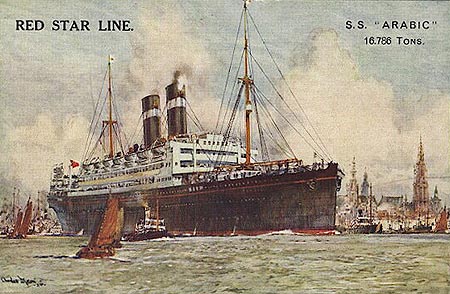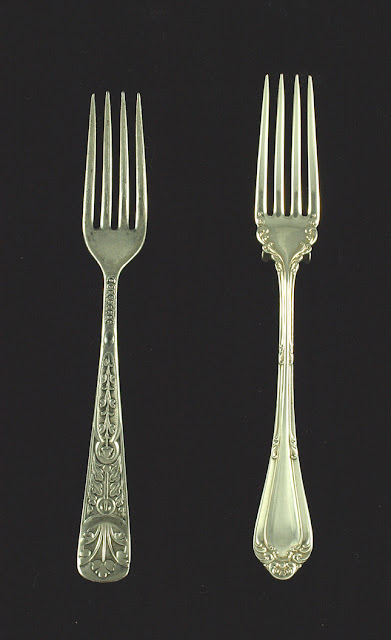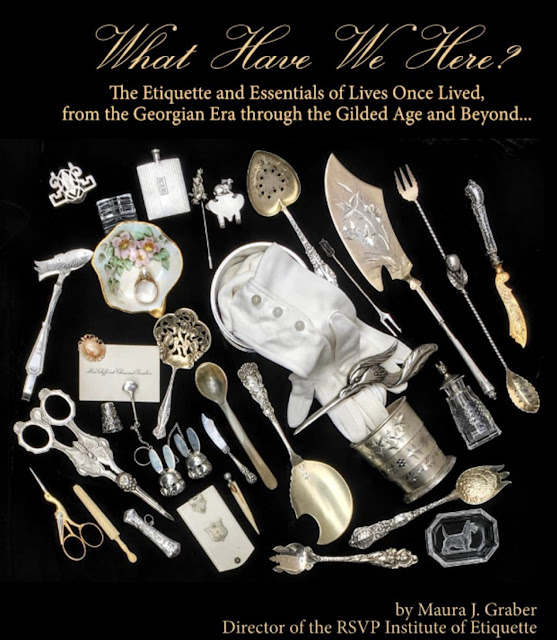“Dining
is the privilege of civilization. The rank which a people occupy in the
grand scale may be measured by their way of taking their meals, as well
as by their way of treating their women. The nation which knows how to
dine has learnt the leading lesson of progress. It implies both the will
and the skill to reduce to order, and surround with idealisms
and graces, the more material conditions of human existence; and
wherever that will and that skill exist, life cannot be wholly ignoble.” ~ Isabella Beeton
Mrs. Beeton was certainly not the first woman of her time to feel that anyone who was not of “civilized European, breeding and cultivation” was somehow a savage. At the time, it was fairly common to assume that if one had not been “discovered” yet by Europeans, one simply did not exist, or was somehow uncivilized. Actually, many tribes and civilizations were so well ordered, and had manners so strict and concise, they considered Europeans to be completely ignorant rubes. Barbarians, who ate with their swords, exhibited filthy habits and displayed disgusting mannerisms, etc... And they hadn't shown up at Europe’s doors with flags waving, declaring Europe and the United Kingdom their new property either. So though Mrs. Beeton was truly helpful in helping housewives of the day get their homes settled, she displayed the same insensitivity and ignorance of her peers at the time. Below is just a bit of the text on dining, from her well-known book on Household Management, along with some etiquette for women of the day.
Dinners and Dining
Man, it has been said, is a dining animal. Creatures of the inferior races eat and drink; man only dines. It has also been said that he is a cooking animal; but some races eat food without cooking it. A Croat captain said to M. Brillat Savarin, "When, in campaign, we feel hungry, we knock over the first animal we find, cut off a steak, powder it with salt, put it under the saddle, gallop over it for half a mile, and then eat it." Huntsmen in Dauphiny, when out shooting, have been known to kill a bird, pluck it, salt and pepper it, and cook it by carrying it some time in their caps. It is equally true that some races of men do not dine any more than the tiger or the vulture. It is not a dinner at which sits the aboriginal Australian, who gnaws his bone half bare and then flings it behind to his squaw. And the native of Terra-del-Fuego does not dine when he gets his morsel of red clay. Dining is the privilege of civilization. The rank which a people occupy in the grand scale may be measured by their way of taking their meals, as well as by their way of treating their women. The nation which knows how to dine has learnt the leading lesson of progress. It implies both the will and the skill to reduce to order, and surround with idealisms and graces, the more material conditions of human existence; and wherever that will and that skill exist, life cannot be wholly ignoble.
It has been said, indeed, that great men, in general, are great diners. This, however, can scarcely be true of any great men but men of action; and, in that case, it would simply imply that persons of vigorous constitution, who work hard, eat heartily; for, of course, a life of action requires a vigorous constitution, even though there may be much illness, as in such cases as William III. and our brave General Napier. Of men of thought, it can scarcely be true that they eat so much, in a general way, though even they eat more than they are apt to suppose they do; for, as Mr. Lewes observes, "nerve-tissue is very expensive." Leaving great men of all kinds, however, to get their own dinners, let us, who are not great, look after ours. Dine we must, and we may as well dine elegantly as well as wholesomely.
There are plenty of elegant dinners in modern days, and they were not wanting in ancient times. It is well known that the dinner-party, or symposium, was a not unimportant, and not unpoetical, feature in the life of the sociable, talkative, tasteful Greek. Douglas Jerrold said that such is the British humour for dining and giving of dinners, that if London were to be destroyed by an earthquake, the Londoners would meet at a public dinner to consider the subject. The Greeks, too, were great diners: their social and religious polity gave them many chances of being merry and making others merry on good eating and drinking. Any public or even domestic sacrifice to one of the gods, was sure to be followed by a dinner-party, the remains of the slaughtered "offering" being served up on the occasion as a pious pièce de résistance; and as the different gods, goddesses, and demigods, worshipped by the community in general, or by individuals, were very numerous indeed, and some very religious people never let a day pass without offering up something or other, the dinner-parties were countless. A birthday, too, was an excuse for a dinner; a birthday, that is, of any person long dead and buried, as well as of a living person, being a member of the family, or otherwise esteemed.
Dinners were, of course, eaten on all occasions of public rejoicing. Then, among the young people, subscription dinners, very much after the manner of modern times, were always being got up; only that they would be eaten not at an hotel, but probably at the house of one of the heterae. A Greek dinner-party was a handsome, well-regulated affair. The guests came in elegantly dressed and crowned with flowers. A slave, approaching each person as he entered, took off his sandals and washed his feet. During the repast, the guests reclined on couches with pillows, among and along which were set small tables. After the solid meal came the "symposium" proper, a scene of music, merriment, and dancing, the two latter being supplied chiefly by young girls. There was a chairman, or symposiarch, appointed by the company to regulate the drinking; and it was his duty to mix the wine in the "mighty bowl." From this bowl the attendants ladled the liquor into goblets, and, with the goblets, went round and round the tables, filling the cups of the
guests.
guests.
The elegance with which a dinner is served is a matter which depends, of course, partly upon the means, but still more upon the taste of the master and mistress of the house. It may be observed, in general, that there should always be flowers on the table, and as they form no item of expense, there is no reason why they should not be employed every day.
The variety in the dishes which furnish forth a modern dinner- table, does not necessarily imply anything unwholesome, or anything capricious. Food that is not well relished cannot be well digested; and the appetite of the over-worked man of business, or statesman, or of any dweller in towns, whose occupations are exciting and exhausting, is jaded, and requires stimulation. Men and women who are in rude health, and who have plenty of air and exercise, eat the simplest food with relish, and consequently digest it well; but those conditions are out of the reach of many men. They must suit their mode of dining to their mode of living, if they cannot choose the latter. It is in serving up food that is at once appetizing and wholesome that the skill of the modern housewife is severely tasked; and she has scarcely a more important duty to fulfil. It is, in fact, her particular vocation, in virtue of which she may be said to hold the health of the family, and of the friends of the family, in her hands from day to day. It has been said that "the destiny of nations depends on the manner in which they are fed;" and a great gastronomist exclaims, "Tell me what kind of food you eat, and I will tell you what kind of man you are." The same writer has some sentences of the same kind, which are rather hyperbolical, but worth quoting:– “The pleasures of the table belong to all ages, to all conditions, to all countries, and to all eras; they mingle with all other pleasures, and remain, at last, to console us for their departure. The discovery of a new dish confers more happiness upon humanity than the discovery of a new star.”
The gastronomist from whom we have already quoted, has some aphorisms and short directions in relation to dinner-parties, which are well deserving of notice: – “Let the number of your guests never exceed twelve, so that the conversation may be general.† Let the temperature of the dining-room be about 68°. Let the dishes be few in number in the first course, but proportionally good. The order of food is from the most substantial to the lightest. The order of drinking wine is from the mildest to the most foamy and most perfumed. To invite a person to your house is to take charge of his happiness so long as he is beneath your roof. The mistress of the house should always be certain that the coffee be excellent; whilst the master should be answerable for the quality of his wines and
liqueurs.”
liqueurs.”
† Footnote: We have seen this varied by saying that the number should never exceed that of the Muses or fall below that of the Graces.
A Bit of Etiquette
WHEN A MISTRESS TAKES A HOUSE in a new locality, it will be etiquette for her to wait until the older inhabitants of the neighbourhood call upon her; thus evincing a desire, on their part, to become acquainted with the new comer. It may be, that the mistress will desire an intimate acquaintance with but few of her neighbours; but it is to be specially borne in mind that all visits, whether of ceremony, friendship, or condolence, should be punctiliously returned.
YOU MAY PERHAPS HAVE BEEN FAVOURED with letters of introduction from some of your friends, to persons living in the neighbourhood to which you have just come. In this case inclose the letter of introduction in an envelope with your card. Then, if the person, to whom it is addressed, calls in the course of a few days, the visit should be returned by you within the week, if possible. Any breach of etiquette, in this respect, will not readily be excused. In the event of your being invited to dinner under the above circumstances, nothing but necessity should prevent you from accepting the invitation. If, however, there is some distinct reason why you cannot accept, let it be stated frankly and plainly, for politeness and truthfulness should be ever allied. An opportunity should, also, be taken to call in the course of a day or two, in order to politely express your regret and disappointment at not having been able to avail yourself of their kindness.
IN GIVING A LETTER OF INTRODUCTION, it should always be handed to your friend, unsealed. Courtesy dictates this, as the person whom you are introducing would, perhaps, wish to know in what manner he or she was spoken of. Should you receive a letter from a friend, introducing to you any person known to and esteemed by the writer, the letter should be immediately acknowledged, and your willingness expressed to do all in your power to carry out his or her wishes.
SUCH ARE THE ONEROUS DUTIES which enter into the position of the mistress of a house, and such are, happily, with a slight but continued attention, of by no means difficult performance. She ought always to remember that she is the first and the last, the Alpha and the Omega in the government of her establishment; and that it is by her conduct that its whole internal policy is regulated. She is, therefore, a person of far more importance in a community than she usually thinks she is. On her pattern her daughters model themselves; by her counsels they are directed; through her virtues all are honoured; – “her children rise up and call her blessed; her husband, also, and he praiseth her.” Therefore, let each mistress always remember her responsible position, never approving a mean action, nor speaking an unrefined word. Let her conduct be such that her inferiors may respect her, and such as an honourable and right-minded
man may look for in his wife and the mother of his children. Let her think of the many compliments and the sincere homage that have been paid to her sex by the greatest philosophers and writers, both in ancient and modern times.
man may look for in his wife and the mother of his children. Let her think of the many compliments and the sincere homage that have been paid to her sex by the greatest philosophers and writers, both in ancient and modern times.
Let her not forget that she has to show herself worthy of Campbell’s compliment when he said, – “The world was sad! the garden was a wild! And man the hermit sigh'd, till woman smiled.” Let her prove herself, then, the happy companion of man, and able to take unto herself the praises of the pious prelate, Jeremy Taylor, who says, – “A good wife is Heaven's last best gift to man, – his angel and minister of graces innumerable, – his gem of many virtues, – his casket of jewels – her voice is sweet music – her smiles his brightest day; – her kiss, the guardian of his innocence; – her arms, the pale of his safety, the balm of his health, the balsam of his life; – her industry, his surest wealth; –her economy, his safest steward; – her lips, his faithful counsellors; – her bosom, the softest pillow of his cares; and her prayers, the ablest advocates of Heaven’s blessings on his head.”
Cherishing, then, in her breast the respected utterances of the good and the great, let the mistress of every house rise to the responsibility of its management; so that, in doing her duty to all around her, she may receive the genuine reward of respect, love, and affection!
Note.– Many mistresses have experienced the horrors of house- hunting, and it is well known that “three removes are as good (or bad, rather) as a fire.” Nevertheless, it being quite evident that we must, in these days at least, live in houses, and are sometimes obliged to change our residences, it is well to consider some of the conditions which will add to, or diminish, the convenience and comfort of our homes.






































